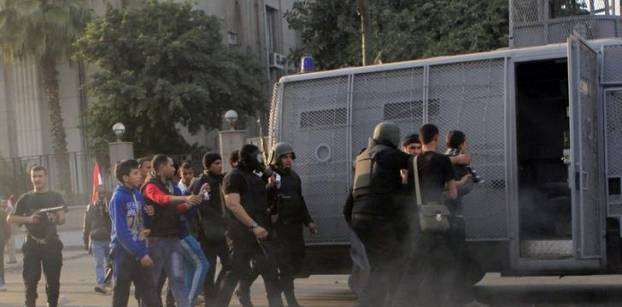Protests expected in Egypt today, interior ministry tightens security measures

Security forces arrest protesters in Ramsis square. REUTERS (Archive)
CAIRO, Apr 25 (Aswat Masriya) - Egypt’s security forces closed roads leading to the press syndicate in downtown Cairo where protests are planned on Monday against a maritime border demarcation agreement signed between Egypt and Saudi Arabia.
Several political forces and public figures had called for protests on Apr. 25, which coincides with Sinai Liberation Day, against the agreement, which stipulates that Egypt will transfer control over the two strategic Red Sea islands of Tiran and Sanafir to Saudi Arabia.
Interior Minister Magdy Abdel Ghaffar warned on Sunday that security forces will respond with "utmost firmness" to any action that disturbs public security, according to a statement published on the ministry’s Facebook page.
The agreement, which has yet to be ratified by the parliament, has stirred up controversy in Egypt since the cabinet announced it signed it in a statement on Apr. 9. Critics argue that the two islands are Egyptian and accuse President Abdel Fattah al-Sisi of "selling Egypt" to Saudi Arabia in return for Saudi aid.
“Egypt is not for sale”, a movement formed by a number of student groups, youth movements, political parties and public figures, announced in a statement on its Facebook page on Sunday that protests will be held outside the press syndicate in downtown Cairo, and in a number of areas close to it.
Security forces have closed the roads leading to the press syndicate with metal barricades and prevented individuals from entering the street where the syndicate is located on foot or walking past the syndicate. Eyewitnesses told Aswat Masriya that riot policemen cordoned the area.
Downtown Cairo is also where Tahrir Square is located. The square was the scene of a protest camp that lasted for 18 days in 2011 amid a popular uprising. The 2011 Uprising resulted in the ouster of former president Hosni Mubarak, who ruled the country for 30 years.
No permission from the interior ministry
The Saudi-Egyptian border demarcation agreement has brought many Egyptians back to the streets after months of reduced participation in political activity.
An assembly law issued in November 2013 and described by Amnesty International as "draconian" outlines regulations and conditions for peaceful protest, practically banning protests.
But on Apr. 15, thousands of protesters gathered in front of the press syndicate under the slogan “Friday of the Land” to protest against the agreement. Protesters ended the demonstration then but said they will resume protesting on Apr. 25.
The April 6 Youth Movement, one of the political forces that announced it will take part in today's protests, did not get a permission from the interior ministry to assembly, the movement's coordinator Amr Fahmy told Aswat Masriya on Sunday.
According to the protest law, which was issued in 2013, assembly organisers must notify the concerned security authorities with their plans for assembly at least three working days in advance. The law also grants the interior ministry the right to cancel, move or postpone assemblies.
Arrests campaign
Days before today’s planned forces, security forces began a campaign of arrests, including during raids on downtown cafes, a security source told Aswat Masriya on Thursday.
Also, another interior ministry official said on the eve of the Apr. 25 protests that the ministry will tighten security measures on trains and buses and in metro stations. Major General Mohamed Youssef, the assistant interior minister for transportation police, told Aswat Masriya that he had order the expansion of the “circle of suspicion,” allowing security forces to stop and inspect people who frequent transportation methods.
But the “Egypt is not for sale” movement, as well as a number of political forces and activists on social media, said they are determined to take part in the planned protests, not only over the islands deal but also to protest against the arrests of political activists in the run-up to Apr. 25.
The Muslim Brotherhood
Among the parties and forces backing today’s protests are the Egyptian Social Democratic Party and the Strong Egypt Party, in addition to a number of student groups and youth movements and the two former presidential candidates Hamdeen Sabahi and Khaled Ali.
The now-banned Muslim Brotherhood group has joined in the call for protest as well, although the “Egypt is not for sale” movement announced in a statement on Facebook on Sunday that they reject the Brotherhood’s attempt to “exploit” the event.
Egypt listed the Brotherhood as a terrorist organisation in December 2013.
President Sisi was the country's defence minister in 2013 when he led a military ouster of then-President Mohamed Mursi, who hails fro the Muslim Brotherhood, following mass protests against Mursi's rule.
The group had led a wave of protests calling for Mursi's reinstatement as president in 2013, but a once-vigorous wave of protests waned after a fierce by the Egyptian authorities.









facebook comments